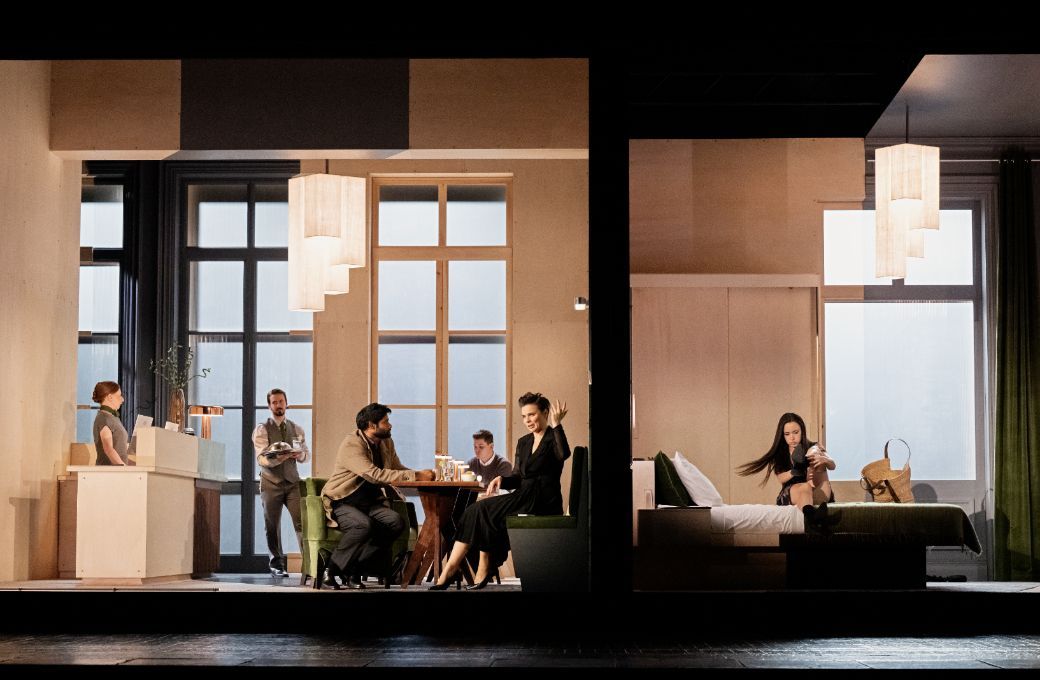Lest the director’s widely reported charge of misogyny in the opera world be visited upon yours truly, let me remind everyone that the recent Welsh National-Scottish Opera co-production of The Makropulos Case was overwhelming thanks to inspired direction by Olivia Fuchs. The Royal Opera, having entrusted Janáček’s dramatic fantasy to quondam enfant terrible Katie Mitchell, then felt obliged to trail her vision as “bold” when it was anything but. Hackneyed would be nearer the mark. Mitchell wheeled out her tired old tropes and borrowed a fair few others (projected text messages date back three decades to Patrick Marber’s play Closer). Slow-motion walking? Check. Gratuitous sexual shenanigans? Check. Cramped, low rooms? Check. Unnecessary updating? Check. Deficient blocking and sightlines? Check.

To breathe cleaner air, we should turn to the musical performance, which was stunning. If anyone doubted the choice of Jakub Hrůša for the music directorship of The Royal Opera, the twin peaks of Tosca and Makropulos so early in the season will have silenced them. Janáček, of course, is the Czech maestro’s home turf, and this wondrous opera is a summit of their musical realm. The orchestra played like angels (idiomatic angels, if such a thing exists) with the composer’s Sinfonietta-esque brass spotlit in a balcony, all at the service of a cast that was as near as dammit flawless.
Makropulos is only as good as its star diva and Aušrinė Stundytė was spectacularly gripping as Emilia Marty, the 337-year-old woman who changes her identity with each passing generation. Every note cut across the footlights with sonorous musical value and shifting dramatic nuance. It was a stellar performance. She even shrugged off a lesbian encounter with the excellent Kristina (here Krista) of American soprano Heather Engebretson, a scene that probably had something to do with feminism but only served to clutter a hyperactive opening act in which crucial exposition was eroded by visual distractions.
As Krista’s father, the solicitor Vítek, tenor Peter Hoare added to his Janáček portfolio with aplomb, while distinguished names like Henry Waddington, Susan Bickley and Johan Reuter also turned up for a cough and a spit. Sean Panniker excelled as EM’s suitor Albert Gregor; Daniel Matoušek and Alan Oke contributed effective cameos as the young Janek and the ancient Count Hauk-Šendorf. Alas, none of these artists were favoured by the poorly focused direction. Mitchell seemed more concerned to project photographs of a Victorian vibrator than to help her singers develop character.
The director’s ever-loyal designer Vicki Mortimer used small adjoining room-boxes to move the eye from location to location, a scenic device that had worked so well in Mitchell’s ambitious Pelléas et Mélisande for the Festival d’Aix-en-Provence but here merely confused the eye, especially in the outer acts where muddle and befuddlement reigned unchecked. I’d defy anyone unversed in The Makropulos Case to unravel the story amid so much visual noise. But, oh, the glorious sound of it.


